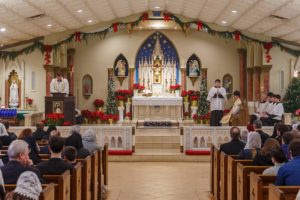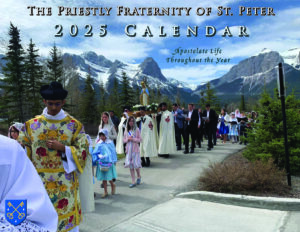Through the Liturgical Year with FSSP Atlanta

“The prayer of the Church is, therefore, the most pleasing to the ear and heart of God, and therefore the most efficacious of all prayers.” So states the Benedictine abbot Dom Prosper Guéranger in the preface to his monumental work The Liturgical Year, a fifteen volume series that guides the reader through every day of the Church’s calendar by means of readings, meditations, prayers and commentary. Dom Guéranger, originally a diocesan priest, became instrumental in restoring monastic life in France after the French Revolution through his revitalization of the abandoned Solesmes Abbey and founding of the French Benedictine Congregation in the 1830s. His Liturgical Year is a goldmine of insights that assist the faithful soul in better praying and understanding the Mass, and St. Francis de Sales Parish, our apostolate in Atlanta, Georgia, has begun a digital delivery service that brings Dom Guéranger’s readings right to your inbox. We recently talked to Fr. James Smith, FSSP, assistant pastor at St. Francis, to learn more.
The Liturgical Year is divided seasonally, each season including an overview of the purpose and liturgical development of that season, a section with the propers of the season (temporal cycle) and a section with the saints of the day (sanctoral cycle). The parish is currently transcribing the entire series onto its website and began the email service this past Advent. The website postings now occur concurrently with the delivery of the emails, both happening as often as Dom Guéranger has material for the day (which is almost every day of the calendar year) and including his full entry for that day. When there is both a temporal and a sanctoral entry, the Atlanta emails conveniently include them both: for example, December 21st, 2019 was both Ember Saturday in Advent and St. Thomas the Apostle’s feast day.

Fr. Smith was introduced to Dom Guéranger’s work while still an Anglican, the parishioner who made the bulletin at his church including excerpts from The Liturgical Year. While the work is available in book form, online or via smartphone app, Fr. Smith said that the parish wanted to make it more convenient and easier to access.
“Really we want more people to pray every day and come and assist at Mass every day,” he explained, while acknowledging that it is not possible for everyone to attend daily Mass. “By reading what the Church is doing in her liturgy, it makes people more likely to love what the Church is doing, makes them want to be there, not out of obligation but out of love.”
If you are not familiar with The Liturgical Year, one of the fascinating things that you will notice when you open the emails is that they include prayers, antiphons and other items taken from not only the Roman liturgical tradition but several others as well, such as the Ambrosian, Armenian and Mozarabic liturgies. This provides the reader with devotional gems that otherwise might be hidden from him, as relatively few of us in the Western tradition are skilled in navigating through the literature of, say, the Syriac Rite and may not know where to start if we wanted to.
“One of the great things about this project is that it provides poetry that people would have never read in many cases, with lovely translations made by English Benedictines,” said Fr. Smith.
And as Dom Guéranger’s preface again says:
We shall hear the several countries, united as they are in one common faith, pouring forth their admiration and love in accents, wherein are blended the most perfect harmony of thought and sentiment with the most marked diversity of genius and expression.
Fr. Smith adds that readers need not feel obliged to read all the entries, which are often comprised of a great deal of material, in their entirety, but rather as much or as little as assists them in their prayer.
“Whatever helps them to pray better and to grow in love for God, that is the goal,” he said.
Signing up for the emails is as simple as going to FSSP Atlanta’s email signup page here. Just type in your name, email, check the “Liturgical Year” box and hit “Submit.” You will then receive an email asking you to confirm that you really want to receive the emails – this is to protect people from spam. Confirm that email and you’re all set. If you’d like to view the corresponding web archive, you can do that here. +
Photos of St. Francis de Sales Parish by Owen Berry.
January 9, 2020








